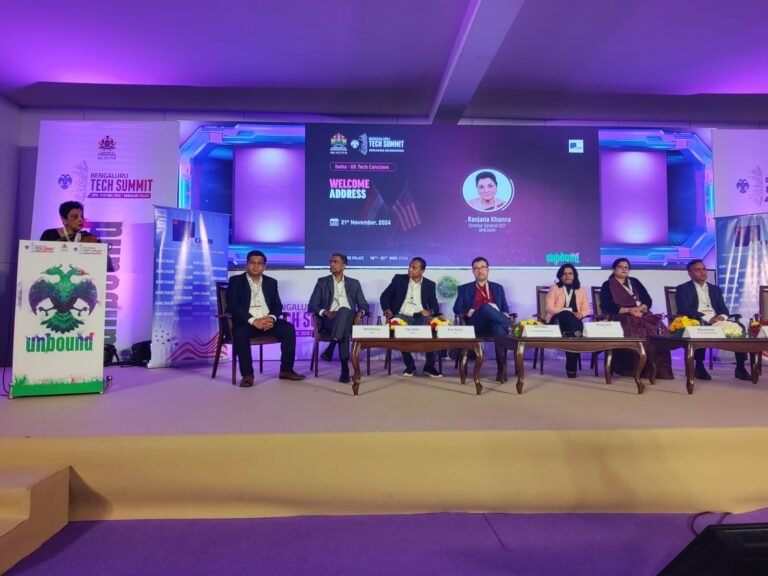Events
Past Events
India-U.S. Tech Conclave at the Bengaluru Tech Summit
AMCHAM partnered with the Department of Electronics, Information Technology, Biotechnology, Government of Karnataka for the Bengaluru Tech Summit (BTS) held from November 19th-21st at the Bangalore Palace. AMCHAM organized the ‘India-U.S. Tech Conclave’ on November 21st which began with opening remarks by Ms. Ranjana Khanna, Director General and CEO, AMCHAM, who emphasized the panel sessions addressed critical issues facing the business and technology landscapes in India. By highlighting the interconnections between security, innovation, and global collaboration, Ms. Khanna set the tone for productive dialogues that would explore how businesses can navigate challenges and seize new opportunities. Her remarks reflected AMCHAM’s commitment to fostering insightful conversations that bridge global trends with local solutions, ensuring India remains a hub of innovation and resilience in a rapidly evolving world. Mr. Chris Hodges, Consul General, U.S. Consulate General Chennai, delivered the special address and shared his vision on the U.S.-India partnership in the tech space as a prelude to the following panel discussions.
The panel on ‘Cybersecurity for Critical Infrastructures in India: Securing the Future of Cloud, Finance, and Interconnected Technologies’ featured speakers Mr. Prem Nithin, Director Sales – Emerging Business, Fortinet, Mr. Kiran Kumar, Chief Architect – Global Cyber Recovery Solution, Dell, Ms. Mrudul Uchil, India Lead, Cyber Security, Visa, Ms. Mehnaz Ansari, Sr. Regional Representative – South Asia, Indo Pacific Region, U.S. Trade and Development Agency, Mr. Samir Mishra, Head – Security Business, Cisco India & SAARC and Mr. Nikhil Kulkarni, Partner, Zinnov as the moderator. The session delved into the escalating risks posed by ransomware, supply chain breaches, and the growing adoption of IoT devices. It was emphasized that outdated architectures, which once offered diversity, have now given way to standardized systems, making them more susceptible to attacks. The role of AI in cybersecurity was a focal point, with discussions highlighting its potential to enhance threat detection, streamline responses, and manage critical data efficiently. However, concerns were raised about vulnerabilities such as data poisoning, which could compromise the reliability of AI-driven systems. The panel also stressed the need for interoperability within critical infrastructure systems, ensuring seamless integration across diverse sectors like banking, transportation, and weather forecasting. Modernization strategies, underpinned by robust roadmaps and global standards, were identified as vital for ensuring resilience. Policymaking emerged as a key enabler, with calls to align with international standards and foster cross-border collaborations, while balancing local regulations and global cybersecurity requirements.
The panel on ‘GCCs to GVCs: Transforming Global Capability Centres into Global Value Centres’ featured speakers Mr. Santosh Kulkarni, Chairman – GCC Committee, AMCHAM and Managing Partner & Global Leader – Global Capability Centres BU, IBM, Mr. Ram Subramaniam, Vice President & GCC Lead, Qualcomm, Mr. David Jea, Deputy Minister Counselor for Economic Affairs, U.S. Embassy, Mr. Arun Shetty, Senior Director – Solutions Engineering, India & SAARC, Cisco, Mr. Richard Kemmling, Partner and Country Head, ACA Group and Ms. Shalini Pillay, India Leader – Global Capability Centres, KPMG in India as moderator. The session explored the transformative journey of GCCs from operational hubs to strategic value creators in the global ecosystem, the multidimensional nature of “value,” emphasizing its evolution from purely financial metrics to broader impacts, such as market diversification, societal contributions, and advancements in ESG objectives. GCCs were highlighted as pivotal in driving innovation, fostering start-up ecosystems, and building resilient supply chains that enhance operational efficiency and sustainability. By serving as hubs for cutting-edge solutions, GCCs are increasingly seen as enablers of long-term strategic value for headquarters and global markets alike. A key theme was the centrality of talent in this transformation, with a focus on inclusivity, particularly improving women’s workforce participation and fostering environments where human potential can rise to its fullest. The discussion stressed the importance of aligning employees’ roles with a greater sense of purpose across the value chain, ensuring that their contributions resonate with the organization’s mission. Collaboration emerged as a cornerstone for success, encompassing co-innovation with external ecosystems, partnerships to enhance intellectual property protection, and fostering trust and reliability across all stakeholders.








